The 23rd Republic of Korea – United Nations Joint Conference: Strengthening Global Biosecurity in the Face of Emerging Challenges
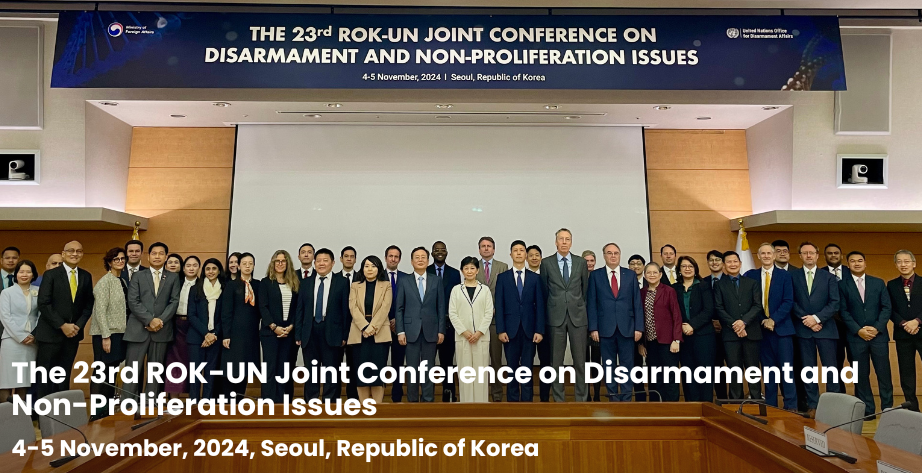
[Photo 1] Group Photo
The 23rd Republic of Korea – United Nations Joint Conference on Disarmament and Non-Proliferation Issues, held on November 4-5, 2024, in Seoul, Republic of Korea, brought together over 100 experts, policymakers, and young professionals to tackle the critical issue of biological security. The conference, themed “The Biological Weapons Convention at Fifty: Strengthening Global Biological Security in a Rapidly Evolving Technological Landscape,” was co-organized by the Government of the Republic of Korea and the United Nations Office for Disarmament Affairs (UNODA), alongside the Implementation Support Unit (ISU) of the Biological Weapons Convention (BWC).
The event marked a pivotal moment for the Asia-Pacific region as it commemorates the upcoming 50th anniversary of the BWC. Against a backdrop of growing geopolitical tensions and advances in biotechnology, the conference emphasized the urgency of fortifying global biosecurity frameworks to address both existing and emerging biological risks. It underscored the significance of international collaboration in ensuring that biological technologies contribute to global well-being while mitigating potential threats.
Highlights of the Conference
Opening Remarks: A Call for Regional and Global Action
The conference commenced with remarks from H.E. Mr. CHO Koo Rae, Vice Minister for Strategy and Intelligence, Ministry of Foreign Affairs, Republic of Korea, and Ms. Izumi Nakamitsu, UN Under-Secretary-General and High Representative for Disarmament Affairs. Both speakers highlighted the urgency of addressing new challenges posed by biotechnology, artificial intelligence, and global health crises. They called for strengthened regional cooperation and proactive international efforts to safeguard the integrity of the BWC.
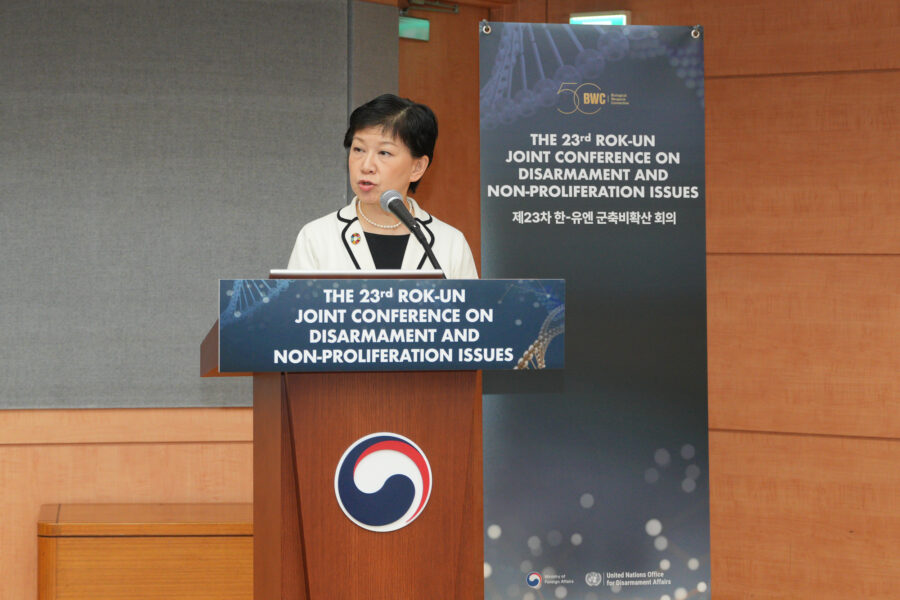
[Photo 2] Ms. Izumi Nakamitsu, UN Under-Secretary-General and High Representative for Disarmament Affairs, delivering the opening remarks
Mr. Cho emphasized the risks posed by emerging pathogens and advances in dual-use technologies, urging participants to collaborate in crafting robust frameworks to manage these challenges. Ms. Nakamitsu applauded recent regional initiatives, such as the ASEAN Leaders’ Declaration on Strengthening Regional Biosafety and Biosecurity, as pivotal examples of collective action.
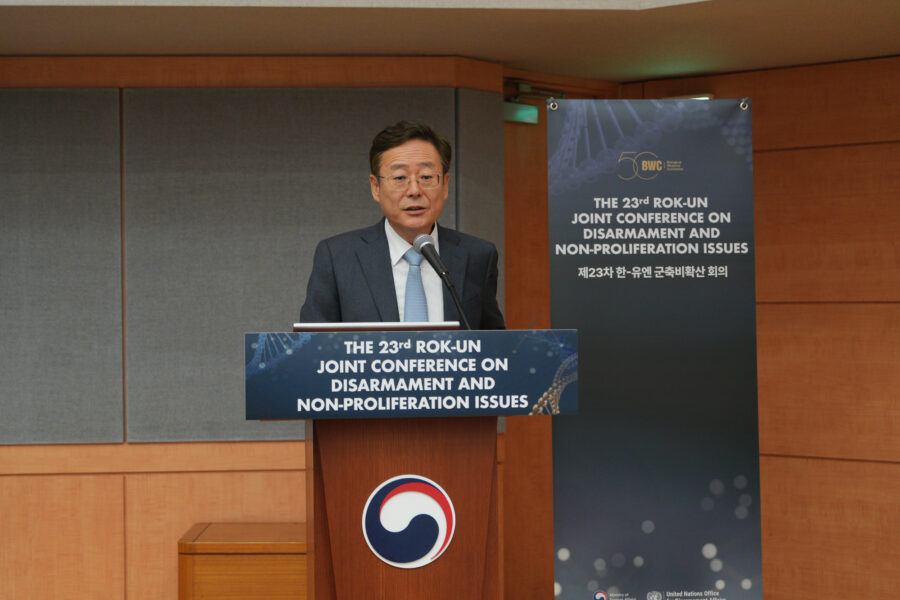
[Photo 3] Mr. CHO Koo Rae, Vice Minister for Strategy and Intelligence at the Ministry of Foreign Affairs, Republic of Korea, delivering the opening remarks
Expert-Led Discussions on Key Themes
The conference featured eight thematic sessions, each delving into critical aspects of biosecurity and the BWC’s role in addressing modern challenges:
1. Emerging Biological Risks: Discussions focused on the dual-use nature of biotechnology and the need for biosecurity education and equitable capacity-building across nations. Panelists explored how advances in biotechnology have improved public health but also introduced risks, particularly with the rise of synthetic biology and artificial intelligence. Participants underscored the importance of integrating scientific advancements with ethical considerations to prevent misuse.
2. International Cooperation: Participants emphasized regional workshops and initiatives as key to enhancing preparedness and response strategies, underscoring the critical role of coordinated global efforts. Highlighting success stories, such as the ASEAN-Canada regional collaborations and EU CBRN Risk Mitigation Centres, the session showcased the benefits of fostering partnerships to address shared challenges.
3. Biosafety and Biosecurity Frameworks: Regional efforts, such as the ASEAN Leaders’ Declaration on Strengthening Regional Biosafety and Biosecurity, were recognized as significant steps forward. Discussions noted the progress made through updated laboratory regulations and the establishment of codes of conduct for scientists, such as the Tianjin Biosecurity Guidelines. However, challenges in coordination and resource allocation were also discussed, highlighting the need for continuous investment in human capacity and infrastructure.
4. Preparedness and Response Capabilities: Panelists advocated for joint simulation exercises, integrated response plans, and transparent communication to enhance public trust and operational effectiveness. Case studies on past outbreaks, such as SARS and COVID-19, demonstrated the importance of well-prepared public health systems and rapid information-sharing mechanisms to mitigate the impact of biological threats.
5. Confidence-Building Measures: Participants lauded the growing submission rates of BWC Confidence-Building Measures while recommending further enhancements to promote transparency. Innovative approaches to streamline reporting processes and ensure accuracy were discussed, with participants expressing optimism about the increasing engagement among States Parties.
6. Youth Perspectives: For the first time, the conference featured a dedicated youth perspective session as part of its main program. This session highlighted the importance of engaging young people in shaping the future of the BWC mechanism. Young leaders proposed innovative approaches, such as AI-driven predictive
surveillance, while the “Youth for Biosecurity Declaration” called for greater inclusion of scientists in bio-risk management efforts. Discussions underscored the critical need to empower the next generation of biosecurity experts through mentorship, education, and active participation in global dialogue, ensuring their voices contribute meaningfully to the advancement of international security frameworks.
7. Verification and Compliance: Experts discussed potential frameworks for verifying compliance with the BWC, drawing lessons from other international regimes. They explored how the development of targeted inspection protocols could deter violations while fostering trust among States Parties.
8. Regional Priorities: Building on the lessons of the COVID-19 pandemic, participants stressed the importance of regional cooperation, training, and the creation of a global biosecurity standard. Panelists identified opportunities to integrate perspectives from diverse stakeholders, including economists and environmentalists, to address interconnected challenges effectively.
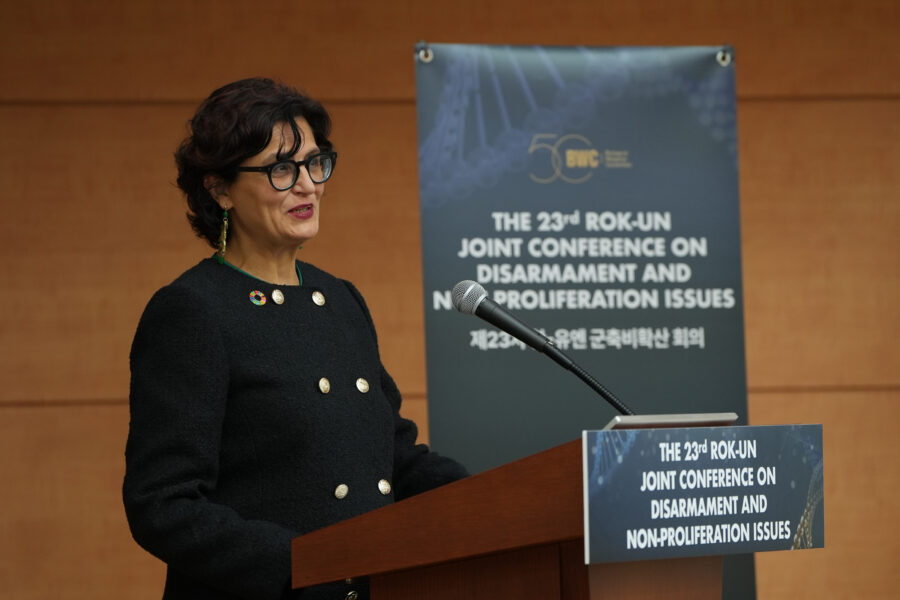
[Photo 4] Ms. Radha Day, Chief of RDIOB at UNODA, delivering the closing remarks
Key Outcomes and Next Steps
The conference concluded with a strong call to action, emphasizing the need for:
· Strengthened biosafety and biosecurity frameworks at regional and global levels.
· Enhanced interdisciplinary collaboration to address complex biosecurity challenges.
· Increased youth engagement and innovation in biological risk management.
· Greater transparency and international cooperation to reinforce the BWC’s implementation.
Additionally, the conference highlighted the importance of leveraging existing platforms, such as ASEAN + 3 and the Asia Summit, to foster deeper collaboration and capacity-building. Participants also proposed the development of guidebooks and tailored educational curricula to equip scientists and policymakers with the knowledge needed to navigate the evolving biosecurity landscape.
As the international community prepares to celebrate the BWC’s 50th anniversary in 2025, this conference reaffirmed the pivotal role of collective efforts in ensuring biotechnology serves humanity while mitigating its risks. The event underscored the Asia-Pacific region’s commitment to shaping a safer, more secure future in biological security and beyond. By integrating insights from diverse stakeholders and building on existing initiatives, the
conference charted a path forward to strengthen global biosecurity governance in an era of rapid technological change.
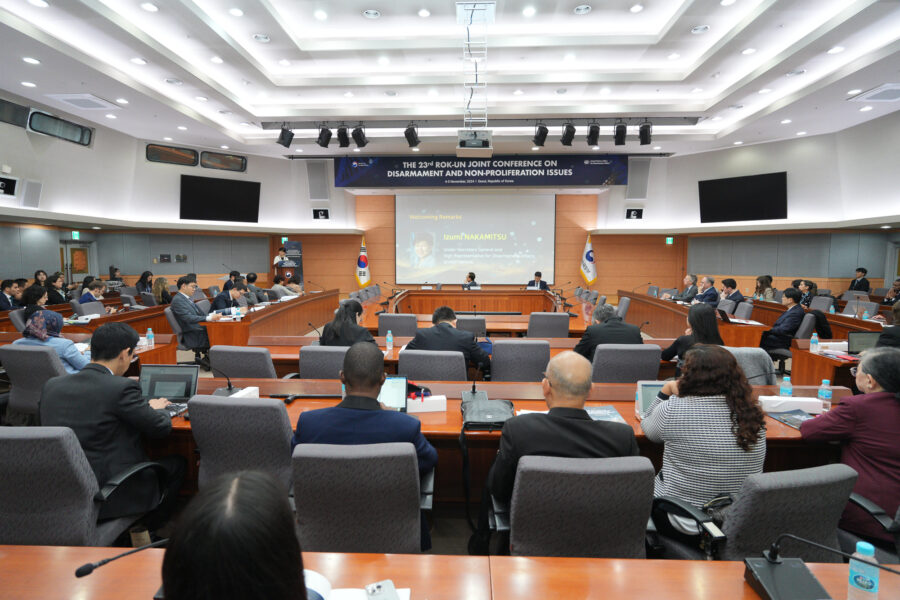
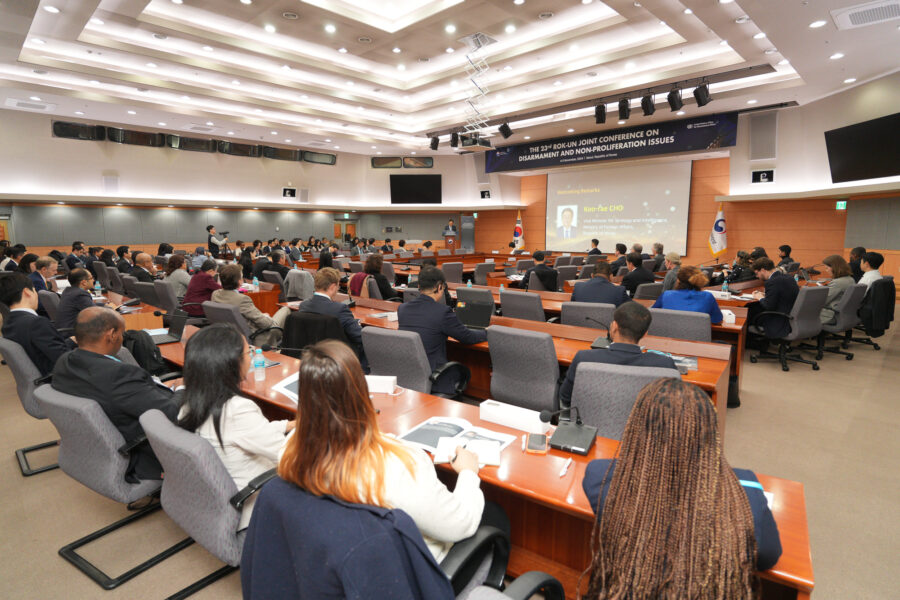
[Photo 5-6] Overview of the conference venue
For more information about the conference and upcoming initiatives, please contact us at unrcpd-info@un.org.
More Photos: https://www.unrcpd.org/gallery/the-23rd-rok-un-joint-conference-on-disarmament-and-non-proliferation-issues/

